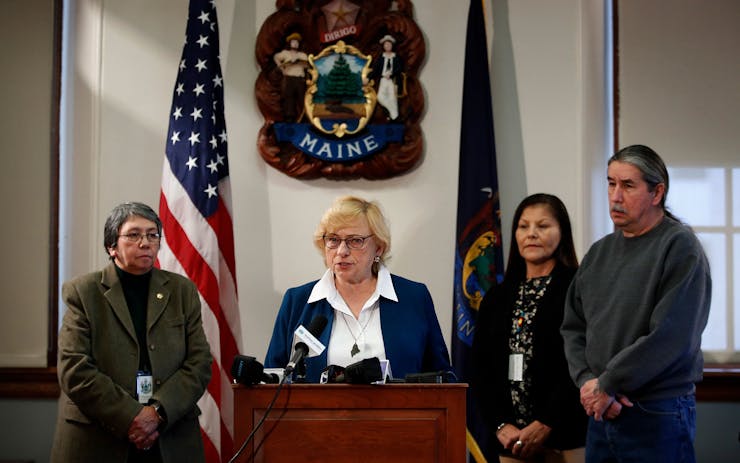A tribal attorney arrested for possessing cannabis while fighting for Passamaquoddy tribe land rights in 1968 was granted a posthumous pardon on Tuesday.
Democratic Gov. Janet Mills had tears in her eyes after signing the pardon for the late Don Gellers on Tuesday, telling a group including tribal leaders that justice “was a long time coming.”
Mills’ office said it is believed to be the first posthumous pardon issued in the state.
The story behind the arrest
Supporters of Gellers, who died five years ago, contend law enforcement officers arrested him in 1968 to quash his tribal land claims and advocacy for the tribe. Gellers’ early work laid the groundwork for Maine’s tribal land claims settlement act, which happened in 1980.
'There’s merit to the idea that he was singled out and targeted,' the governor told reporters.
“There’s merit to the idea that he was singled out and basically targeted,” the governor told reporters.
The facts of the case were unusual.
The attorney general prosecuted Gellers under a felony statute that derailed his legal career after police found six cannabis cigarettes in his home. The felony conviction stood even though lawmakers had made minor possession a misdemeanor by the time of his appeal and his disbarment from the legal profession in Maine, Mills said.
The Portland Press Herald called attention to the circumstances surrounding Gellers’ fall from grace in a 2014 series, “Unsettled: Triumph and tragedy in Maine’s Indian country.”
Gellers was denied a new trial even after a prominent Boston attorney said a state prosecutor, John Kelly, told him Gellers had been set up, the newspaper reported. Kelly told the newspaper that he didn’t remember the events that way but agreed that law enforcement officers were out to get Gellers.
Life after the conviction
After his legal appeals were exhausted, Gellers informed the state attorney general that he was immigrating to Israel, where he adopted his Hebrew birth name, Tuvia Ben-Shmuel-Yosef. He fought and was wounded in the 1973 Arab-Israeli war.
'This pardon cannot undo' the harm of Gellers' conviction, but 'it can bestow formal forgiveness.'
Later, he studied to become a rabbi and moved to New York City. He died in 2014 at age 78.
“While this pardon cannot undo the many adverse consequences that this conviction had upon Mr. Gellers’ life, it can bestow formal forgiveness for his violation of law and remove the stigma of that conviction,” the governor said Tuesday.
Shop highly rated dispensaries near you
Showing you dispensaries nearJoining the governor at the ceremony were Donna Loring, a Penobscot Indian who serves as her senior adviser on trial affairs, Passamaquoddy Vice Chief Darrell Newell from Indian Township, and Rena Newell, Passamaquoddy representative in the Legislature.
“People even today are respectful for him being an advocate for native folks,” Darrell Newell said. “He was a warrior for the Passamaquoddy tribe.”
Don Gellers never sought a pardon from a governor of Maine on his own behalf. A few months before his death, a Press Herald reporter asked whether he would want one. “Well, yes,” Gellers replied. “Yes, that would be nice.”
In related news, recreational cannabis sales in the state of Maine are likely to begin in March with state officials starting to accept retail applications last month. State residents originally voted to legalized recreational cannabis use in November 2016.





